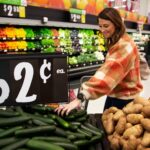
What’s a speedy checkout worth to you? Would you pay more to shop at a store with a good selection, a nice layout, and with employees who don’t make you bag your own groceries?
Grocery prices are at the top of everyone’s mind lately when they step into a supermarket. But convenience is important, too – so much so, that many shoppers are willing to sacrifice low prices for a better shopping experience.
That’s one of the findings in Deloitte’s new report, “A Fresh (Food) Take on Grocery Convenience“. Among the shoppers it surveyed, prices are important – but convenience is king.
The 2,000 consumers surveyed for the report said they would be willing to pay an average of 17% more “for more convenient fresh food.” Deloitte also surveyed 100 grocery retail executives, who optimistically estimated that their customers would be willing to pay 41% more. So they overshot what their customers are willing to pay – but still, 17% is not nothing.
And what kind of convenience is worth paying 17% more for? Convenience, it turns out, is about a lot more than just how close a store is to your home. Three-quarters of shoppers said their number-one priority for a more convenient grocery shopping experience is speedier checkouts. 59% want more convenient store layouts, 51% want easier returns and 41% want helpful services like having employees bag their groceries.
Overall, more than half of shoppers said they value convenience now more than they did in the past, and a quarter said convenience is their top priority when grocery shopping. The grocers surveyed preferred to believe that quality was their customers’ top concern, but they ranked convenience second, ahead of low prices and good value.
The good news, then, is that grocers who act on the findings in Deloitte’s report may look for ways to make your shopping experience better and more convenient. The bad news is, Deloitte’s report also urges grocers to “avoid overreliance on expensive discounts and promotions in pursuit of boosting sales.” So prioritizing convenience could mean paying for it in the form of higher prices and fewer deals.
Personalization is one way to help making shopping more convenient – but at what cost? In order for a store to be able to recommend items it thinks its customers would like to buy, shoppers “often need to share their preferences, aversions, allergies and other health-related dietary needs, religious dietary restrictions, and other personal information,” Deloitte notes. But two-thirds of shoppers aren’t sure their stores would use this information and associated technology responsibly.
Grocers are far more optimistic, with 80% saying they envision using artificial intelligence to help make their customers’ shopping experience more convenient. But only a quarter of shoppers express interest in using an AI-powered shopping assistant, and more than half have no interest in receiving AI-generated messages from their grocery store.
While a full-sized, full-service grocery store has much to offer, many shoppers consider the simple act of popping into a discount or dollar store for a quick purchase to be rather convenient, with no creepy AI to worry about. When asked where they’re most likely to shop when they want convenience, though, nearly half said traditional grocery stores.
“Despite their growing desire for quick and easy choices, consumers still show significant preference for their neighborhood grocery stores,” Deloitte principal of Retail and Consumer Products Adam Almond said in a statement. “Grocers can capitalize on, and look to enhance, that loyalty through innovative solutions that pair fresh food with more convenience.”
Someday, AI-powered shopping assistants will be able to create a grocery list for you, help you find items in the store, and make grocery shopping more convenient than ever. Until then, for the majority of shoppers, a fast checker and a helpful bagger will do. No one ever said convenience needed to be complicated.
Image source: frankieleon










